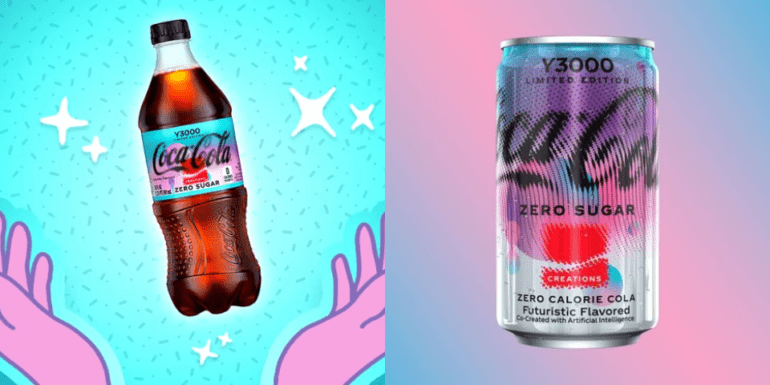TL;DR:
- Coca-Cola’s AI-developed Y3000 soda fails to impress, offering a lackluster taste experience.
- The flavor falls short of its “Futuristic Flavored” tagline, leaving a bland aftertaste of berries and sugar.
- AI’s role in crafting the recipe raises questions about its culinary capabilities.
- Even with a cold or ice, Y3000 fails to deliver a compelling soda experience.
- The augmented reality (AR) feature accompanying Y3000 provides hyperrealistic yet underwhelming images.
- Coca-Cola’s ambitious AI-driven venture falls flat, raising concerns about the future of AI in culinary innovation.
Main AI News:
In a world where artificial intelligence has permeated nearly every facet of our lives, it was only a matter of time before the beverage giant Coca-Cola decided to jump on the AI bandwagon. They set their sights on a new flavor for their iconic soft drink, enlisting the help of AI as their culinary guide. As inquisitive minds at Gizmodo ventured to investigate, the outcome left much to be desired.
Imagine the anticipation of a bold and futuristic flavor as you twist open a bottle of Coca-Cola’s Y3000, aptly named for the Year 3000. However, the reality falls far short of expectations. The tagline “Futuristic Flavored” promises a taste of tomorrow’s prosperity, but what it delivers is a lackluster experience. Instead of the familiar acidic and carbonated sensation of a regular Coke, Y3000 meanders to the back of the palate, offering nothing more than a tepid encounter with your taste buds. It vanishes almost as quickly as it arrives, leaving behind a faint aftertaste of berries and sugar.
AI, it seems, has conjured up a revamped version of the same old taste, devoid of any novelty. Unlike the myriad of inventive Oreo flavors that compel you to sample them, Y3000 offers nothing more than buzzwords without buzzworthiness. In short, Coca-Cola’s Y3000 is a disappointment. It’s a beverage best left unopened.
Kevin Hurler, not much of a soda enthusiast, hesitated as he took his first sip of Y3000, wondering if his palate had grown accustomed to a more subdued flavor profile over the years. It wasn’t until his co-writer, Kyle Barr, shared the same sentiments that they collectively arrived at a conclusion—this novelty beverage simply lacked the pop they had hoped for. In a word, it was bland.
Though the initial taste test was conducted with a chilled bottle, fairness demanded a second trial with ice. Surprisingly, the cold didn’t breathe life into Y3000; if anything, it accentuated its dullness. At $1.99 per bottle, plus tax, seldom did such a sum feel like such a letdown. Y3000, it appeared, was all show and no substance.
Kyle Barr had harbored low expectations, but even those were dashed by Coca-Cola’s offering. After all, AI has a notorious track record when it comes to recipe creation, be it cocktails or budget-friendly meals. AI, like OpenAI’s ChatGPT and Google’s Bard, lacks the ability to predict the taste outcome of its concoctions. It merely relies on past ingredient combinations, and if Y3000 truly bore AI’s influence, it’s plausible that Coca-Cola had to make significant recipe modifications to render it even remotely palatable.
Despite the marketing efforts, digital branding, and AR gimmicks, the taste remains subpar. Y3000, to put it bluntly, is a disappointment. Don’t even consider taking a sip.
But Coca-Cola’s ambitions with Y3000 don’t stop at just the beverage itself. They’ve also unveiled an augmented reality (AR) experience to complement this futuristic endeavor. Scanning the QR code on the Y3000 bottle transports you to a web app that harnesses your photos to offer a glimpse into the year 3000. However, the outcome is less than groundbreaking.
The images generated by this AR experience, while glossy and polished, don’t quite live up to the hype. They bear a striking resemblance to the output of a run-of-the-mill AI image generator, featuring hyperrealistic depictions of a utopian city (inspired by New York) and a colorful assortment of trinkets (derived from an office desk photo). While it’s a novel addition, it doesn’t compensate for the lackluster flavor of Y3000 itself.
Conclusion:
Coca-Cola’s underwhelming foray into AI-generated soda, with its Y3000 offering, highlights the challenges of relying solely on AI for culinary innovation. The disappointing flavor and lackluster AR experience underscore the limitations of AI in the culinary world. This setback serves as a reminder that while AI has its place in many industries, it still has much to prove in the realm of creating truly exceptional and novel taste experiences. This may prompt beverage companies to approach AI-driven flavor development with caution and perhaps reconsider the role of human expertise in crafting outstanding culinary products.

